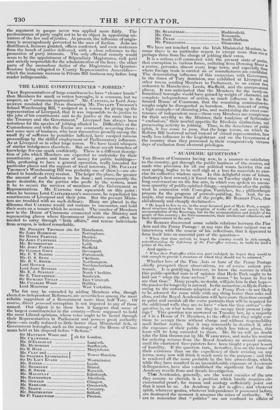THE LARGE CONSTITUENCIES " JOBBED."
THAT Representatives of large constituencies have "cleaner hands" than Members for small or rotten boroughs, is a common, but we suspect, an " erroneous impression." Mr. CANNING, as Lord ASH.. BURTON reminded the Peers discussing Mr. Poumrrr THOMSON'S Inland Warehousing Bill, " assigned as a reason for giving up the representation of Liverpool, that it was impossible to do justice to
j
the jobs of his constituents and to do justice at the same time to the Treasury and the Government." Liverpool has always been notorious for the species of jobbing alluded to. Difficulties at the Customhouse and with the Excise arc constantly occurring there ; and some men of business, who bear themselves proudly among the small fry of sufferers by penalties inflicted, have escaped ruinous proceedings by the skilful employment of Parliamentary influence. As at Liverpool so in other large towns. We have heard whispers of similar indulgences elsewhere. But on these occult branches of knowledge few can speak confidently. There is a different descrip- tion of jobs which Members arc expected to undertake for their constituents : grants and loans of money for public buildings— bills, professing to have a general operation, really intended for particular places and the support of local interests, (Mr. POULETT Tnomson's Warehousing Bill was probably one of these)—are ob- tained in hundreds every session. The larger the place, the greater the amount of such business to be done ; and consequently the more desirable, for the parties who profit by the system, must it be to secure the services of members of the Government as Representatives. Mr. CANNING was squeamish on this point : when he became Lord CASTLEREAGH'S successor, he repudiated his constituents of Liverpool and their jobs. But the present Minis- ters are troubled with no such delicacy. Many are placed in the dilemma that CANNING would not venture to encounter, and hold their scats on a tenure which he scorned. The number of Members now in the House of Commons connected with the Ministry and representing places where Government influence must often be needed to carry through "little affairs," and rescue individuals from scrapes, is indeed remarkable.
Mr. PouLETT Tuomsost sits for Manchester.
Sir JOHN HORHOUSE Nottingham.
Sir HENRY PARNELL Dundee.
Sir JOHN CAMPBELL Edinburgh. Mr. RUTHERFURD Leith.
Mr. JOHN PARKER Sheffield.
Sir GEORGE GREY Devonport.
Mr. F. T. l3AniNo Portsmouth.
Chatham.
Northampton. Northumberland. Stroud.
North Cheshire. Sandwich.
East Cornwall. Halifax.
"Vest Yorkshire.
The list may be extended by adding Members who, though elected as independent Reformers, arc nevertheless among the most reliable supporters of a Government more than halt"Pory. Of course, direct personal corruption is not imputed to any of those named. Our object is to show how it happens that sonic of the largest constituencies in the country—those supposed to hold the most Liberal opinions, whose voice ought to be heard through their Representatives in Parliament and possess great authority there—arc really reduced to little better than Ministerial •Iiefs, or Government boroughs, such as the manager of the House of Com- mons held at his disposal before " Reform."
Sir MATTHEW Wool) and }
sit for London.
Mr. G. S. BYNG
Mr. R. V. SMITH Lord HOWICK
Lord JOHN RUSSELL Mr. E. J. STANLEY Sir E. TROUBRIDGF
Sir RICHARD VIVIAN Mr. CHARLES WOOD
Lord MourEirn
Mr. CRAWFORD Mr. D'EyNcouRT Lans.1:eth.
Mr. HUMPHERY Southwark.
Sir B. IlAu Mary lebone. Mr. CLAY and Tower Hamlets.
Sir STEPHEN LUSHINGTON 1 Sir DE LACY EVANS Westminster.
Mr. BAINES Leeds.
Mr. BERKELEY Bristol.
Mr. B. Swim Norwich.
Mr. MACAULAY Edinburgh.
Mr. BANNERMAN Aberdeen.
Mr. OSWALD Glasgow. Mr. BARNARD Greenwich.
Mr. ELLICE Coventry. Mr. BROTHERTON Salford.
Sir P. FLEETWOOD Preston. Mr. STANSFIELD Huddersfield.
Mr. ORD Newcastle.
Mr. PEASE South Durham.
Mr. PHILLPOTTS Gloucester.
We have not touched upon the Irish Ministerial Members, be, cause there is no particular reason to except more than two a perhaps three from the charge of jobbing their votes. It is a serious evil connected with the present state of parties, isz that corruption in various forms, radiating from Downing Street as a centre, pervades almost every large town, and especially those where foreign trade is carried on or manufactures are established. The demoralizing influence of this connexion with Government, in the times of Tory dominion, was exhibited at Liverpool and other towns sending Members to Parliament, to an extent then • unknown in Manchester, Leeds, Sheffield, and the unrepresented •• places, It was anticipated that the Members for the newly-en, franchised boroughs would have gained by weight of character, and complete independence of action, so much influence in the Re. formed House of Commons, that the remaining nomination-ho. roughs might be disregarded as harmless. But, instead of setting a high example—of shunning jobs, and maintaining the erect coun- tenance of independent men—these very Members are conspicuous for their servility to the Minister, their toadyism of fashionable" " exclusives," their morbid appetite for frivolous distinctions, and perseverinab activity in jobbing. Thus, in the decadence of public spirit, it has come to pass, that the large towns, on which the Reform Bill bestowed actual instead of virtual representation, have really less influence in the Legislature and on the Government of the country than they possessed in their comparatively virtuous days of exclusion front electoral privileges.


























 Previous page
Previous page